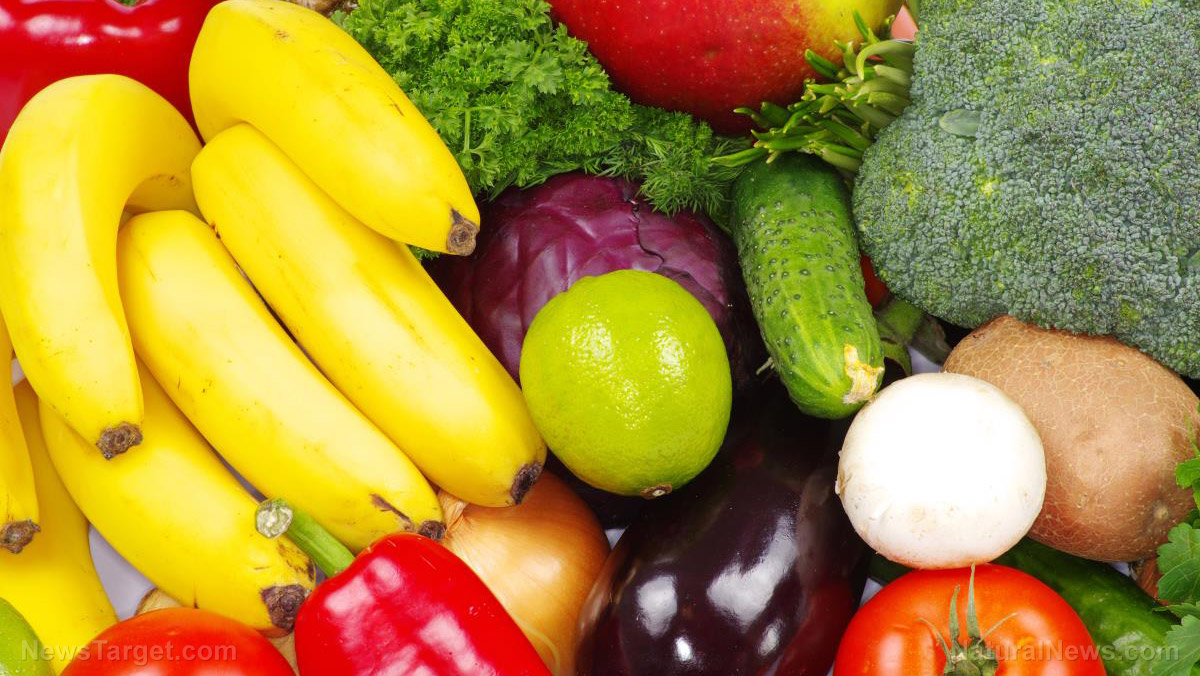Unlocking the healing power of nature: Dr. Thomas S. C. Li’s “Vegetables and Fruits: Nutritional and Therapeutic Values”
07/02/2025 / By Belle Carter

- Dr. Thomas S. C. Li’s book argues for a return to foundational nutrition, emphasizing the health and therapeutic benefits of vegetables and fruits amid modern dietary crises. It challenges processed food reliance and highlights the critical role of phytochemicals in well-being.
- The book bridges ancient wisdom (e.g., Hippocrates’ “Let food be thy medicine”) with modern research, offering a detailed analysis of nutrients and health benefits in over 100 plant species. It emphasizes that no single food provides complete nutrition, advocating for dietary diversity.
- Dr. Li draws on Asian cultural traditions, showcasing unique nutritional and therapeutic applications of plant-based foods. This perspective enriches the book’s relevance for healthcare, food professionals and nutraceutical development.
- The text highlights phytochemicals (e.g., flavonoids, carotenoids) with antibacterial, anti-inflammatory and anticancer properties. It cites studies linking increased vegetable/fruit consumption to reduced cancer risk, aligning with guidelines like those from the American Institute for Cancer Research.
- Targeted at professionals and consumers alike, the book serves as a resource for food industries (e.g., developing nutraceuticals) and individuals seeking health improvement. It systematically covers vitamins, minerals and bioactive compounds, underscoring their roles in disease prevention and treatment.
A groundbreaking book by Dr. Thomas S. C. Li, “Vegetables and Fruits: Nutritional and Therapeutic Values,” offers a compelling argument for a return to the basics of human nutrition. Published at a time when health crises linked to poor dietary choices are rampant, this book serves as both a wake-up call and a practical guide for those seeking to harness the power of plant-based foods. Dr. Li, a respected researcher, delves into the nutritional and therapeutic benefits of vegetables and fruits, challenging readers to reconsider their dietary habits and embrace the wisdom of traditional diets.
The book arrives at a critical juncture. As modern society grapples with the consequences of diets high in processed foods, Dr. Li’s work emphasizes the critical role of vegetables and fruits in maintaining health and combating disease. “Our current health crisis is largely due to a lack of understanding about the power of plant-based foods,” Dr. Li asserts. This statement is echoed by modern dieticians who agree that plant foods should form the bulk of our diet. While cereals and legumes are important, it is vegetables and fruits that are the primary sources of essential phytochemicals, compounds that are vital for optimal bodily function.
Dr. Li’s exploration of the therapeutic properties of food harks back to a time before the advent of pharmaceutical medicine, when herbal doctors relied on trial and error to unlock the healing potential of various foods. This ancient wisdom is encapsulated in the words of Hippocrates, “Let food be thy medicine,” and further reinforced by Benjamin Franklin’s adage, “An apple a day keeps the doctor away.” However, Dr. Li’s book goes beyond these simple truths, providing a detailed analysis of the nutritional and health-related constituents of a wide array of vegetables and fruits.
One of the book’s key strengths is its focus on the Asian perspective. Asian cultures have long recognized the value of plant-based diets, and Dr. Li’s work draws on this rich tradition, highlighting the unique benefits of Asian plant foods. This is not merely a celebration of tradition but a scientific exploration of the nutritional and therapeutic applications of these foods. The book is an invaluable resource for healthcare and food professionals, providing critical information that can be applied in the provision of nutritious food and the creation of health-related consumer goods.
Dr. Li’s research is particularly relevant for those in the applied food and health industries. It offers insights that can help in the development of nutraceutical and pharmacological extracts from vegetables and fruits, many of which have the potential to become highly profitable in areas where they are not currently grown or utilized. The book is a must-read for producers, processors and marketers of plant-based foods, as well as for those seeking to improve their own health.
The book is meticulously organized, with chapters dedicated to the major constituents and therapeutic values of over 100 species of each of the vegetables and fruits. Chapters 2 and 5 focus on the vitamins and minerals found in these foods, while Chapter 3 delves into the flavonoid, isoflavone and carotenoid content of raw vegetables. Chapter 6 explains how the use of vegetables and fruits can protect or improve human health, emphasizing the importance of a diverse diet.
Dr. Li underscores the fact that no single vegetable or fruit provides all the nutrients we need. This is why variety is crucial. For instance, root vegetables are rich in calcium and iron, essential for bone health and preventing conditions like osteoporosis. Vegetables and fruits are also the main source of vitamin A, with carotenoids like beta-carotene found in carrots, spinach and sweet potatoes playing a vital role in maintaining our health.
The book also highlights the role of phytochemicals in disease prevention. Flavonoids, abundant in vegetables and fruits, have been shown to possess antibacterial, antiviral, anti-inflammatory and even anticancer properties. Studies have demonstrated that increased consumption of vegetables and fruits can significantly reduce the risk of cancer. The American Institute for Cancer Research provides guidelines that emphasize a diet rich in plant-based foods, further validating Dr. Li’s findings.
“Vegetables and Fruits: Nutritional and Therapeutic Values” is a comprehensive guide that underscores the importance of plant-based foods in our diet. Whether you’re a healthcare professional, a food industry expert, or someone simply looking to improve your health, this book is a treasure trove of information that you won’t want to miss.
Learn more about the nutritional and therapeutic values of fruits and vegetables by watching the video below.
This video is from the BrightLearn channel on Brighteon.com.
Sources include:
Submit a correction >>
Tagged Under:
#nutrition, alternative medicine, diet, food cures, food is medicine, food science, fruits, healing, health science, natural cures, natural health, natural medicine, Naturopathy, organics, vegetables
This article may contain statements that reflect the opinion of the author





















